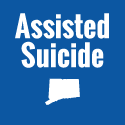Maggie Karner addresses the East Coast Conference Against Assisted Suicide (photo by Ellen Kolb).
I suppose you could say that Brittany Maynard and I became the overnight internet brain cancer poster children on either side of the assisted suicide debate. Within a few days of writing an opinion article for The Federalist and The Hartford Courant opposing her decision to kill herself, I started getting calls and TV interviews right and left, but the one thing the producers and editors all mentioned was that they wanted to interview me because I had the same terminal diagnosis and therefore apparently that made me qualified to speak on the topic of assisted suicide. I guess they were looking for the “emotional right hook” as news outlets are wont to do. But this left me conflicted because does that mean that anyone without a terminal diagnosis cannot express an opinion on assisted suicide?! Even still, after recent TV interviews and YouTube hits on my video to Brittany, I received many tweets and online comments that reprimanded me by generally saying “Who are you to judge her?” — even with my brain tumor “qualification!”
I think this is just another symptom of our post-modern society has left for us; today’s world tells us that if you have an opinion on something, apparently you are “judging” the people who have a different opinion. And it follows that society would like you to just shut up.
But what happened to the great American free marketplace of ideas? What happened to rigorous and scholarly debate, with evidence, over issues that affect our society? What’s worse, it seems you can only have an opinion on something today if you have lived through it, felt its wrath, or walked in its shoes. Because in our modern culture, it’s all about FEELINGS, folks. If you have reams of evidence on the positives or negatives of something, apparently this is not applicable—what matters is how you FEEL about the issue and whether people like how you said it.
Which leads us to those heartbreaking videos of Brittany produced by “Compassion & Choices” (formerly known as The Hemlock Society). The up-close glimpse into her personal agony and suffering contrasted with the beautiful, young, energetic newlywed she was just a year ago. Of COURSE we feel bad for her. Of COURSE we want her to feel better…whatever she requests…after all, who are WE to turn her request down? We shouldn’t “judge!” We haven’t been through anything like that.
But here’s the thing: It’s not just about Brittany; or just about me; or just about anyone else with a terminal illness or a disability. It’s about ALL OF US! Her videos took one person’s very real, very tragic situation and tried to put it into a narrative that applies to everyone. And that leads to the old saying that judging on the basis of the hard cases makes bad law.
This is a public policy issue which needs a vigorous debate from ethicists and experts. It is a public policy issue—just like Obamacare or the Keystone pipeline, for crying out loud! AND it’s a moral issue that affects how society rudders itself. Essentially, it determines what we choose to look like as a civilized society.
Additionally, if you’re a Christian like me, then it is also a spiritual issue, directed by our Lord, that provides much opportunity for spiritual growth through suffering and selfless caregiving as we and our loved ones prepare for our eternal life with Christ.
But it doesn’t HAVE to be a spiritual issue. There is enough meat on the bones of this topic just as a social and policy issue that we could chew for years. But Compassion & Choices apparently doesn’t want a reasoned public debate on this issue, they want people to react emotionally with their feelings. And that’s why you got Brittany Maynard, and those heartbreaking videos that went viral.
Proponents of assisted suicide and euthanasia want to capitalize on our emotions and change our vocabulary in the process. You’ll notice that Brittany refused to use the word “suicide” and preferred to call it other euphemistic terms such “death with dignity.” I’ve heard other people refer to it as “ending one’s own life.” But this is simply an illusion. We have to come to terms with the fact that assisted suicide—let’s call it what it is—affects others, and not just those close to the self-appointed victim, but ALL of us…especially the weak, disabled and vulnerable.
How long will it be before the “right to die” quickly devolves into the “duty to die” for all those who are elderly or disabled or wondering if they’ve become a burden to their family?
And let’s also look for a moment at how assisted suicide affects the patient/doctor relationship. I chose my oncologist at Yale because I personally think he is a rock star in the world of brain tumor care. I was diagnosed in April of 2014, and to this day my doctor will not give me any kind of a timeline for my disease…on purpose. He wants me to fight and live without adding an arbitrary timeline—essentially a monkey on my back—to add to the constant stress that cancer diagnosis brings. Because, I’ve got news for you: we all have a timeline…we’re all going to die…someday. But no one knows when. My doctor made sure I knew the general definitions of glioblastoma and the high reoccurrence rate and low survivability data. He told me to “do the things now that I enjoy or that are meaningful to me.” But he refuses to speculate on me. Because I’m an individual and every person deserves the right to fight. However, what if our fragile and overburdened healthcare system determines that it is not in our society’s (or the third-party payer’s) best interest to offer a “an extension on an already terminal case” …but perhaps it would be more economically expedient if they recommend suicide pills instead of chemo?
That is why our country must continue to expand state efforts to increase availability of home care, early access to hospices and palliative care and a continued expectation that even when we are at our weakest, the strong arm of the state will be there to protect and defend our choice for care, not offer suicide as a false choice for empowerment or the illusion of control.
So my whole point to make is that I have a brain tumor…so what?! That does not qualify me any more than you to speak about the danger to our society that assisted suicide poses. Don’t ever let anyone tell you that you can’t have an opinion because you “haven’t been through it.” Learn the data and get the information you need to have an opinion and to express it. Because this topic isn’t just for folks with an unfortunate diagnosis to decide. This topic needs to be decided every one of us because it affects us all.



















